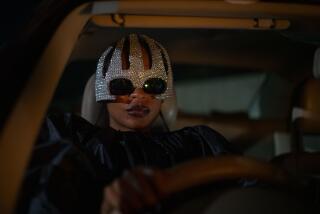From the Archives: A royally divisive queen: The politics behind Cannesâ boos for Sofia Coppolaâs âMarie Antoinetteâ
One of the most talked-about films at this yearâs Cannes Film Festival has been Sofia Coppolaâs âBeguiled.â The positive reception to the film at Cannes has brought back memories of the 2006 edition of the festival, when Coppolaâs âMarie Antoinetteâ was famously booed. But as Kenneth Turan wrote in this essay first published on Oct. 13, 2006, the reason behind the boos wasnât purely about the filmmaking.
-----------
WHO OWNS HISTORY? And, more to the point, who owns Marie Antoinette?
Though theyâre not usually phrased that way, those questions have swirled around Sofia Coppolaâs quietly exuberant new film about the doomed young French queen (only 18 when she ascended the throne, 37 when she was executed) since it premiered at the Cannes Film Festival earlier this year to some scattered â and widely misunderstood â boos.
For the displeasure came not, as might be expected, from the French critics â whoâd already seen the film and whose generally positive notices were already on record in Le Film Francais, the French trade paper â but from political types who had an ax to grind about the filmâs portrait of the woman in question.
Hard as it is to believe in the U.S., a country whose citizens have a hard time getting upset about what happened last week, much less centuries ago, the French take their history very seriously. And the filmâs undeniably sympathetic look at Marie Antoinette goes contrary to a fierce cultural bias against the queen that, according to the excellent recent PBS documentary, also called âMarie Antoinette,â made her âthe most hated woman in Franceâ and may even have been one of the factors that led to the French Revolution.
In English-speaking countries, Coppolaâs film has to some extent had to face a related bias, unhappiness that it doesnât conform to a tyranny of expectations and preconceptions that the film isnât weighty or serious enough in tone to take on such a fraught historical situation. Which was exactly the point.
Speaking in Cannes before the filmâs premiere, Coppola emphasized her determination to do a historical movie âin my style, to make it my own film, something I wanted to see. That was the most important thing, not to fall into the habits of generic period movies, not to get pushed into âThis is how you should do it.ââ
That attitude resulted in a seductive pastel palette inspired by the âsherberty colorsâ of the celebrated macaroons of Paris confectioner Laduree. And Coppola ânever thought twiceâ about her decision to use modern pop music on a soundtrack that eventually included Bow Wow Wowâs âI Want Candyâ and songs by New Order, the Strokes and the Cure. âI wanted atmospheric, dreamy contemporary music, that kind of teenage girl spirit.â By playing a rousing Gang of Four anthem over the opening credits, the film effectively announces that this is going to be a historical drama unlike those weâve seen before.
The reason for that is that Coppola, though inspired by Antonia Fraserâs magisterial biography, had her own particular take on the Marie Antoinette story, her very specific tone â âThe O.C.â set in Versailles â to impart to the proceedings.
Intrigued by the fact that Marie and her husband, Louis XVI, were young people, ages 18 and 20, when he became king and they entered historyâs stage, Coppola says she âliked the idea that she was a real girl, someone who didnât like to do schoolwork; that there were all these teenagers running around in Versailles being in charge.â
In fact, according to that PBS documentary (now available on DVD), much of the way Coppola depicts Marie Antoinette is quite in line with the facts. Simon Schama, a noted British historian and authority on the French Revolution, says the queenâs mother, the Austrian Empress Maria Teresa, thought of her child as âmy airhead daughter, the shopaholic,â and that once Marie Antoinette became queen, she âcollected a group of cheeky Valley girlfriends around her.â
Though it sometimes surprises nonprofessionals, historians know that varying attitudes toward and interpretations of history are the very heart of a discipline that values theory and point of view as much as facts.
In truth, the argument swirling around a new book about the Founding Fathers and the writing of the U.S. Constitution, âRevolutionary Characters: What Made the Founders Different,â by Gordon S. Wood, makes just this point.
Setting the ship of American history off on a whole new course was Charles Beardâs âEconomic Interpretation of the Constitution of the United States,â published in 1913, a book that argued that the Constitution was, as one reviewer explains, âa counterrevolutionary document, drafted by aristocrats who wanted a strong national government to protect their investments.â Wood, by contrast, argues that this is all wrong, that the Founders, in another reviewerâs words, were âa selfless, heroic eliteâ that âacted with nobility and self-sacrifice.â You pays your money and you takes your choice.
Similarly, the arguments about the appropriate way to view Marie Antoinette have been going on for hundreds of years. As historian Schama vividly put it on PBS, âis she a cutie pie or a monster; is she a virgin or is she a whore; is she a dimwit or a Machiavellian desperado?â Like the battle over the Founding Fathers, itâs an argument that shows no sign of going away, an argument to which Coppola has added an entertaining and accomplished point of view.
See the most-read stories in Entertainment this hour Âť
Movie Trailers
Twitter: @KennethTuran
More to Read
Only good movies
Get the Indie Focus newsletter, Mark Olsen's weekly guide to the world of cinema.
You may occasionally receive promotional content from the Los Angeles Times.











